Archive for January, 2014
Украинцы, прошу вас не умирать!
26 Jan 2014То, что происходит сегодня в Украине, — крайне печально. Хорошо лишь одно: пока больше не гибнут люди. Но, к сожалению, здесь ключевое слово — «пока».
Хотелось бы призвать всех к сдержанности, потому что ценнее человеческой жизни ничего нет. Новые жертвы не принесут радости ни власти, ни Майдану, ни всему украинскому народу. Единственный вариант, который видится мне, — это вариант нулевой.
Властям нужно отпустить всех задержанных, остановить вылазки «Беркута», бандитский отлов активистов на улицах, привлечь к ответственности тех силовиков, которые в открытую издеваются над людьми. Иначе — тупик. 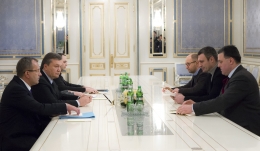
Протестующим — не возобновлять силовые действия, не кидать камни и коктейли Молотова в милицию. И с этого стартового уровня, если он (я очень надеюсь!), будет достигнут, — переговоры, переговоры, переговоры…
Да, это, быть может, непопулярно среди людей усталых и крайне обозленных беспределом властей, которых (людей) я прекрасно понимаю. И сейчас виртуальные «камни» полетят уже в меня, и пусть, но другого пути нет (по крайней мере, со стороны мне видится так). Вернее, он есть, но даже не хочется себе его представлять.
Прекрасно осознаю, что мой голос далек, слаб и ничтожен, что я не имею никакого влияния ни на власть, ни на оппозицию, но все-таки хочу буквально на коленях просить знакомых и не знакомых мне украинцев, стойких и отчаянно смелых: ни в коем случае не снижая мирного давления на власть, найти в себе силы на терпение и мудрость.
Не надо запрещать лидерам оппозиции, какими бы они вам ни казались, вести переговоры с властью. Пусть они их ведут и от вашего имени добиваются реально возможного, а максимально возможное — подождет. На мой взгляд, шанс снизить смертельно опасный накал ситуации и исключить риск возобновления бойни есть.
Главное — чтобы все вы остались живы. Вы мне очень дороги, я вас очень люблю. И, конечно, в итоге вы победите. Но праздновать победу свободы над диктатурой нужно, не понеся невосполнимых потерь.
Иначе эта победа будет Пирровой, и вы сами не заметите, как вдруг окажетесь в той реальности, которая не понравится вам самим.
Blog – Ayder Muzhdabaev – Айдер Муждабаев – Facebook –
О гражданской войне в Украине.
23 Jan 2014Россияне невольно запутались в терминах. Или их запутали. Поясню.
Когда Виталий Кличко или кто-то из украинской оппозиции говорит об угрозе гражданской войны, они имеют в виду не совсем то, что слышится в России. Или совсем не то. 
В Украине не будет гражданской войны — то есть войны одних простых граждан с другими простыми гражданами. Этот вариант можно не рассматривать, украинцы, западные и восточные, северные и южные, конечно, немного разные, но они не ненавидят друг друга. И у них одна родина, что бы, например, за них Лимонов ни говорил.
А вот другая гражданская война — война отчаянных граждан с ненавистной и презираемой, потерявшей самоконтроль властью бабла и беспредела — вполне может начаться.
На условном востоке менее массовая, на западе — более. Но украинцы природные бунтари и партизаны, в Донецке и Харькове тоже достаточно свободолюбивых и смелых людей, и с таким народом я бы никому не рекомендовал шутить. А тем паче стрелять в него. Прилетит обратно.
Это будет жестоко и страшно. Всем — и гражданам, и представителям власти, и “силовикам”. Погибнут невинные. В том числе люди в форме, которых трусливые бандиты подставят под удар. Но, к несчастью и ужасу, это может случиться.
Если Янукович со своей криминальной “семьей” не поймет, что всю Украину нельзя “отжать”, всех украинцев нельзя “опустить”, “закошмарить” — и не найдет в себя разума остановится. Или Януковича не остановят. Те из власти и крупного бизнеса, кому еще хочется спокойно пожить. Да просто пожить.
А тот вариант, что в украинские дела хоть каким-то насильственным образом втянут Россию и русских людей, я даже рассматривать не хочу. Это будет преступлением против обоих народов, которое не простится и не забудется никогда.
Blog – Ayder Muzhdabaev – Айдер Муждабаев – Facebook –
John Paul II’s personal papers are to be published by the Krakow-based Znak Publishing Institute, even though the late Polish Pope asked for the documents to be burnt after his death.
Znak’s director Henryk Wozniakowski said the papers include the Pope’s prayers and reflections as well as notes showing the Pope’s concern for those dear to him and for the Church.
The 640-page book, entitled ‘I am in God’s hands. Personal notes 1962-2003’ will hit the bookstores on 5 February.
In his will, John Paul II wanted his notes burnt after his death but his personal secretary, Stanisław Dziwisz, now the Archbishop of Kraków, did not fulfil the Pope’s wish.
Explaining his decision in the preface to the book, Dziwisz,writes that the Pope’s personal notes are of historical importance and “the key to interpreting his spirituality, his innermost self: his relationships with God, others and himself”.
Pope John Paul II will be canonized, together with Pope John XXIII, on 13 April.
Source: Radio Polska
Utrillov, A Moscú sin kalàshnikov.
11 Jan 2014 “Durante 11 años, la voz de Daniel Utrilla sonaba en los teléfonos de EL MUNDO, “soy Daniel, de Moscú”, y todos sonreíamos. Que tipo, Daniel. Apenas lo conocíamos en persona, porque nunca hizo ‘mili’ en la redacción. Sabía ruso, de modo que lo ficharon para enviarlo en el acto a Moscú; el resto de noticias eran rumores casi cómicos: llevaba una perillita como de escritor del XIX, el alias de su correo personal era ‘utrillov’, era más joven de lo que se pensaba, estaba obsesionado con Dragó y con el Real Madrid… 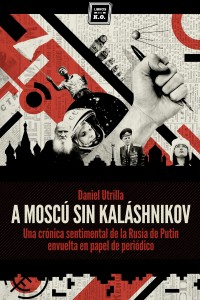
Un correo de ‘utrillov’ llega con sus explicaciones sobre ‘A Moscú sin kalàshnikov’. “¿Por qué Rusia? Después de escribir este milhojas de 500 páginas creo haber llegado a la conclusión de que fue un flechazo estético a través del cine (que conformaba una imagen demasiado pérfida de Rusia como para no resultar tentadora) y de la literatura, con esos personajes rebozados en nieve y devorados por dudas existenciales mientras aman, luchan, crecen, se reproducen y mueren…
“La mujer rusa es fascinante. Es muy femenina de puertas hacia fuera (algunas, de hecho, se pintan como puertas) pero en su interior rebulle un alma de matrona. Son de una belleza subyugante que genera en el extranjero algo parecido al ‘landismo’, que es una reacción física, real y palpable (palpable sobre todo en los bailes ‘agarraos’, lance folclórico de la noche moscovita al que dedico seis o siete páginas de mi libro). Pero junto a esa belleza dolorosa la rusa tiene un carácter dominador, que compensa con una ternura y una entrega extremas. En Rusia no valen las medias tintas. Se ama y se odia apasionadamente, sin minutar… El amor en Rusia es una experiencia total y totalitaria… ”
Articulo – El Mundo – Cultura – 09.01.2014
Poland, No conspiracy in Sikorki’s death.
3 Jan 2014A five-year investigation into the death of Polish World War II leader General Wladyslaw Sikorski has found no evidence to support conspiracy theories that he was murdered.
Institute of National Remembrance (IPN) has found no proof that Poland’s wartime prime minister was either murdered prior to the flight, or that the plane crash itself was caused by sabotage. 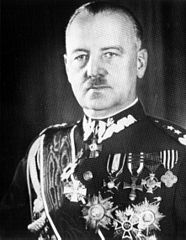
In a statement, IPN concluded that there is “no reasonable doubt” in the question of his boarding the plane alive.
The Polish leader’s death on 4 July 1943 remains a riddle to many, in spite of an official wartime investigation that claimed the crash was an accident.
Sikorski, who headed the Polish government-in-exile in London, was flying back to England after visiting Gibraltar when his Liberator plane plunged into the sea, shortly after take-off.
Apart from the pilot, who survived with broken limbs, all aboard apparently died immediately, although some bodies were never recovered, further fuelling conspiracy theorists.
Accusations have been levelled at Russia, Britain and a clique of Polish army officers over the years.
An official British military investigation blamed the crash on jammed controls in the cockpit.
As revealed in March 2013 by Piotr Dabrowski from IPN, besides archival work, two witnesses have been interviewed for the current probe in England and Spain.
The first was a radio operator who participated in the British navy’s salvage operation, immediately after the plane went down. The second was a diver who helped extract bodies from the wreck.
Claims that Sikorski had been murdered prior to take off were largely dispelled following the exhumation of his remains in 2008 at Wawel Cathedral, Krakow.
Noted British historian Professor Norman Davies told that “no reputable historian” had ever insisted that sabotage was the cause of Sikorski’s death.
Polskie Radio – Articles
“As of January 2014, restrictions are lifted on Romanians and Bulgarians seeking long-term work in other EU member states. But experts say expectations of massive immigration from the two countries are likely unfounded.
Ideally, Nicu would like to stay in his home country, Romania. He worked as an electrician for a large electricity provider in western Romania for 25 years. His employer used to be a state-owned company until it was taken over by a foreign investor.
Many of his colleagues lost their jobs in the last couple of years. 45-year-old Nicu was initially allowed to stay. “But because of staff shortages, I had to pull double shifts,” said Nicu, who doesn’t want his last name published. “I was so tired that sometimes I almost fell asleep while I was driving.” …
Article – Deutsche Welle
ЕС с Россией вместе.
1 Jan 2014«В России радуются геополитической победе над Европой. Малая Русь спасена от европейского разврата и эксплуатации. О боже, ведь Украина еще до подписания соглашения об ассоциации с ЕС должна была внести изменения в ряд законов и даже Конституцию страны, но снова мешки с баблом задушили демократические права, на соблюдении которых настаивал Европейский союз!…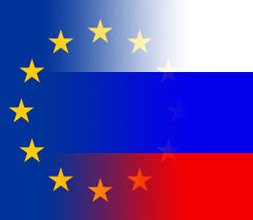
Да, Украина остается частью постсоветского мира, которым с помощью кнута и пряника хочет править Россия. Но все же это временная победа. Украина, как и другие государства, которые образовались после развала Советского Союза, в любом случае будет стремиться к тесному сотрудничеству с Европой, несмотря на то что сегодня их лидеры неприкрыто льстят Кремлю. Более того, курс на сближение с Евросоюзом ждет и саму Россию… » ***
Статья – Иржи Юст – Московский Комсомолец № 26417 от 23 декабря 2013 г. Jiří Just Moskovskij Komsomolets.
Latvia, the 18th member of the eurozone.
1 Jan 2014 Andris Vilks said the recent events in Ukraine, which decided at the last minute to turn down an integration agreement with the EU in favour of closer ties with Russia, demonstrated why the Baltic state of 2m people is joining the euro. “Russia isn’t going to change. We know our neighbour. There was before, and there will be, a lot of unpredictable conditions. It is very important for the countries to stick together, and with the EU,”, added the finance minister. 
Latvia still has close ties with Russia, with about 40 per cent of the bank deposits in the country coming from ex-Soviet states. In the country, which is the 18th member of the euro area, opponents of the currency switch outnumber proponents two-to-one as public expectations for accelerating inflation mount, opinion polls show. Residents are also bracing for taking on new responsibilities in the currency union.
Concern that inflation will accelerate is rising even after consumer prices fell 0.4 percent in November from a year earlier, the sixth month this year without an increase. The Finance Ministry estimates prices will rise 2.3 percent next year as the economy expands 4.2 percent.
“Joining the euro marks the completion of Latvia’s journey back to the political and economic heart of our continent, and that is something for all of us to celebrate,” EU Economic and Monetary Affairs Commissioner Olli Rehn said in a statement.
“Immediately after Latvia joins the eurozone, I imagine we’re going to see an actual spike in dubious money flowing in,” said Mark Galeotti, a professor at New York University who researches organized crime in the former Soviet Union.
For years, Latvia’s political and financial leaders had hoped to create a mini-Switzerland in Eastern Europe — a place where capital in unstable countries such as Russia or Kazakhstan could either park for a while or channel its way further west to banking meccas like Zurich or London.
Lithuania adopts the euro.
1 Jan 2014 Lithuania is the 19th European state to adopt the continental currency. 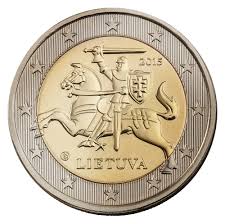 The euro gives the country more freedom in negotiating business with Russia, said Valdas Adamkus, who was president of Lithuania for about a decade until 2009. It provides an extra measure of geopolitical security.
The euro gives the country more freedom in negotiating business with Russia, said Valdas Adamkus, who was president of Lithuania for about a decade until 2009. It provides an extra measure of geopolitical security.
At 0.4 percent, its inflation rate is just a hair above the euro zone average of 0.3 percent, and its 9.5 percent unemployment rate is right in the middle of the pack, and comfortably below the zone average of 11.5 percent. Lithuania’s 1.3 percent real GDP growth rate beats both of its Baltic partners and is again well above the -2.2 percent Euro Zone average.
Welcome
We are a group of long experienced European journalists and intellectuals interested in international politics and culture. We would like to exchange our opinion on new Europe and Russia.
Categories
- Breaking News (11)
- CIS (129)
- Climate (2)
- Energy&Economy (115)
- EU Eastern Dimension (85)
- Euro 2012 – Sochi 2014 – World Cup 2018, Sport (43)
- Euro-Integration (135)
- History Culture (198)
- International Policy (261)
- Military (74)
- Interviews (18)
- Italy – Italia – Suisse (47)
- Odd Enough (10)
- Poland and Baltic States (126)
- Religion (31)
- Russia (421)
- Survey (4)
- Turning points (4)
- Ukraine (176)
- Российские страницы (113)
Archives
- November 2020
- October 2020
- September 2020
- August 2020
- July 2020
- May 2020
- April 2020
- March 2020
- January 2020
- December 2019
- November 2019
- October 2019
- September 2019
- August 2019
- July 2019
- June 2019
- May 2019
- April 2019
- March 2019
- February 2019
- December 2018
- November 2018
- October 2018
- September 2018
- August 2018
- July 2018
- June 2018
- May 2018
- April 2018
- March 2018
- February 2018
- January 2018
- December 2017
- November 2017
- October 2017
- September 2017
- August 2017
- July 2017
- May 2017
- March 2017
- January 2017
- December 2016
- November 2016
- October 2016
- September 2016
- July 2016
- June 2016
- May 2016
- April 2016
- February 2016
- January 2016
- November 2015
- October 2015
- September 2015
- June 2015
- April 2015
- March 2015
- February 2015
- January 2015
- December 2014
- November 2014
- October 2014
- September 2014
- August 2014
- July 2014
- June 2014
- May 2014
- April 2014
- March 2014
- February 2014
- January 2014
- December 2013
- November 2013
- October 2013
- September 2013
- August 2013
- July 2013
- June 2013
- May 2013
- April 2013
- March 2013
- February 2013
- January 2013
- December 2012
- November 2012
- October 2012
- September 2012
- August 2012
- July 2012
- June 2012
- May 2012
- April 2012
- March 2012
- February 2012
- January 2012
- December 2011
- November 2011
- October 2011
- September 2011
- August 2011
- July 2011
- June 2011
- May 2011
- April 2011
- March 2011
- February 2011
- January 2011
- December 2010
- November 2010
- October 2010
- September 2010
- August 2010
- July 2010
- June 2010
- May 2010
- April 2010
- March 2010
- February 2010
- January 2010
- December 2009
- November 2009
- October 2009
- September 2009
- August 2009
Our books




